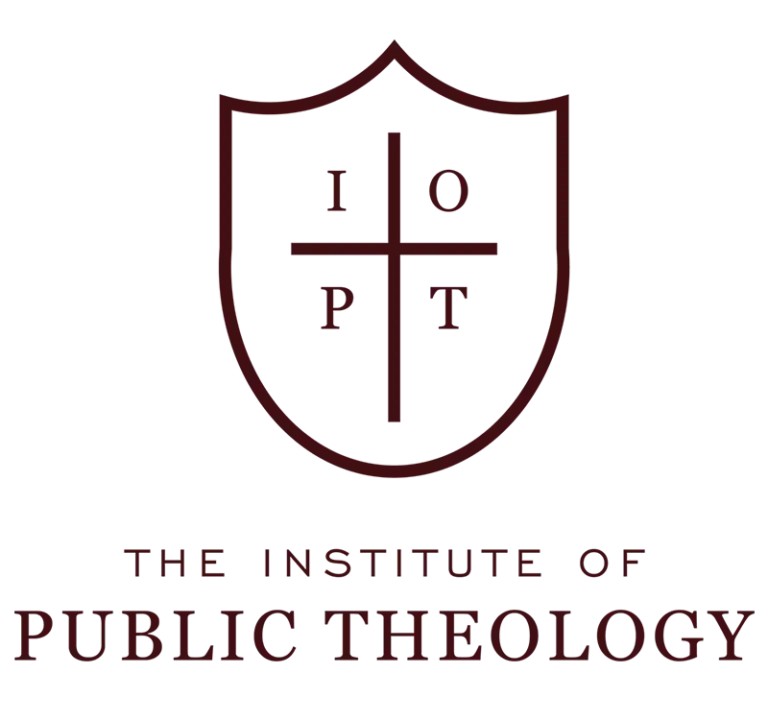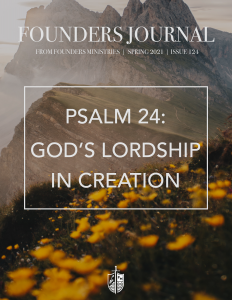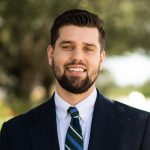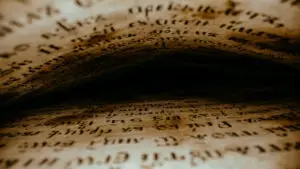This edition of the Founders Journal gives attention to Psalm 24. In his inspired reflections on the Mosaic account of creation, David begins with the beautiful, but definitely counter-cultural assertion, “The earth is the Lord’s and the fullness thereof, the world and those who dwell therein..” The omnipotent sovereignty of the Lord in verses 1 and 2 as manifested in his orderly and purposeful arrangement of all things presses forward to the perfect holiness of the Lord in verses 3-6. He dwells in “his holy place.” Those verses call for “those who dwell therein” (1) to approach him only with perfect holiness and righteousness. This righteousness comes to them in the gracious blessing of salvation (5). Pointing to Jacob (6) reminds us that God’s covenant rules the approach to God. Verses 7-10 describe a scene of the glorious splendor of living in the presence of the Lord “strong and mighty” who defeated all his foes in the great battle for salvation. His ascent to heaven, bringing a host of captives in his train, allowing sinners to revel in his glorious presence, culminates in his placing all things under his feet.
Scott Callaham gives an exposition of the Psalm with the skill of an experienced linguist and biblical exegete and with the sensitivity and passion of one truly adores the Lord of glory. Dr. Callaham lectured in Hebrew and Old Testament for the International Chinese Theological Seminary and has served as lead editor of World Mission: Theology, Strategy, and Current Issues. He is author of Biblical Aramaic for Biblical Interpreters in both English and Chinese. He also curates Daily Dose of Aramaic.
Dr. Mark Coppenger, retired professor of philosophy at The Southern Baptist Theological Seminary and a former professor at Wheaton has given us an excellent study of how God’s lordship in creation lays the groundwork for aesthetics. Mark is an effective writer and author, an engaging teacher, has served in numerous positions of service among Southern Baptists at the national and state levels and also been pastor of churches. Since the triune God is Creator and Sustainer and Owner of the earth, it is impossible that every aspect of it not reflect some element of his glory. The existence of everything is dependent on him and his power, intelligence, beauty, purpose, and glory. The study of aesthetics is the investigation of principles underlying our perception of beauty. This could be applied to art, music, poetry, physics, chemistry, or the mere pleasure of standing in awe of natural things. Mark has given a narrative of how aesthetics has its foundation in the realty that “the earth is the Lord’s, and the fullness thereof.” He has shown the confluence of nature and art in how the beauty, symmetry, and power of the one inspires the other. His article itself is an engagement with aesthetics of language.
I have written an article on drama as an expression of God’s ownership of the world. His revelation in Scripture in the unfolding of the eternally conceived covenant of redemption worked out in connected stages in history determines the elements of story. I seek to show how all good stories that grip the heart, challenge the intellect, and convict the moral consciousness find their patterns in the flow of the biblical story.
A review article of The Mystery of the Trinity by Vern Poythress is a fitting inclusion in this Founders Journal. His argument that the Trinity is “ontologically basic” perfectly fits the Psalmist’s affirmation that “The earth is the Lord’s and the fullness thereof.“ Fallenness has corrupted the mind and thus the process of reasoning making special revelation necessary for any proper understanding of general revelation. For knowledge, therefore, of God and his world, the Bible is “epistemologically basic.” His argument on this issue is clearly and powerfully relevant to sorting out differences within the Evangelical/Reformed community over the subject of natural revelation vis a vis natural theology. And so, where does David’s revealed observation, “The earth is the Lord’s” lead us in that discussion?
Several critical passages of Scripture dealing with how God’s created order necessarily declares his glory, his eternal power and godhead, his beauty and excellence, and his knowability also affirm the blinding effects of human sin. Consequently, for knowledge uncluttered by innate rebellion, creatures have an absolute dependence on special revelation; because knowledge of God is not only a matter of cognition and mental perception but purity of affections, these scriptures emphasize the necessity of holiness and righteousness and consequently redemption.
Psalm 8 early establishes the reality that only those who come to him as children and babes truly see the majesty of his name; this is set in the context of foes and avenging enemies and the eventual rightful dominance of God’s redeemed image-bearers. Psalm 19, after showing the irrepressible universality of God’s revelation through nature, shows its ineffectuality without divinely revealed law leading to conviction of sin, love of holiness, consistent awareness of a deceitful heart, and constant dependence on the revealed word. Psalm 24, our text, shows that the knowledge of God embedded in his creation will become effectual only to those who find holiness and righteousness in salvation and that that comes in the triumphant work of Christ.
Acts 17 unfolds layers of revelation in the created order and in providence and God’s intention that humanity should search for him and find him through induction uncorrupted by moral prejudice. Instead, fallen humanity makes idols of created things arising from fallen imaginations rather than enlightened consciences. Consequently, man cannot know God, though he is not very far from any of us, apart from repentance based on the finished redemptive transaction accomplished by Jesus Christ.
Romans 1 begins with a stern statement that among the things revealed from heaven in this world is divine wrath because the aboriginal moral instinct of man is suppression of the truth. The clarity and power of divine revelation through the “things that are made” leave humanity without excuse. The intrinsic knowledge of God along with the extrinsic compelling evidence of God’s holy power is so mangled by human sin that it leads only to blatant idolatry and ongoing moral perversion.
The most sophisticated societies in philosophy and political organization have failed to produce anything in their religion that comes close to the God of the Bible. Both empirical science and human rationality have failed and cannot even be prolegomena to a true knowledge of God.
What our senses have failed to understand—what eye has not seen and ear has not heard–, and what our philosophy has miserably fallen short in perceiving—what has not entered into the heart of man–, these things God has revealed to us by his Spirit for the Spirt searches all things; yes even the depths of God.
But when grace opens the mind and the heart and one finds the wisdom of God in the face of Jesus Christ, the earth and all that is in it is transformed. Everything becomes a witness to God’s power, his infinite excellence, his love, his mercy, his grace. And all that, as lovely as it is and as increasing as it is in delightful testimony pales in brilliance and glory beside the infinite wonder of redemption through the Son of God.
The editor and the contributors pray that this edition of the FJ will prompt renewed delight in seeing the joyful and exuberant power of God through the things that are made. Right thinking guided by revealed truth can unfold from general revelation abundant data for delight and marvel. The consideration that such a knowledge in all its expansive possibilities is immeasurably below the knowledge of God in the one who “made foolish the wisdom of the world” by the cross of Christ should enhance the delight we sense in the “hope of eternal life.” All things should lead us to a posture of wonder, love and praise.






























